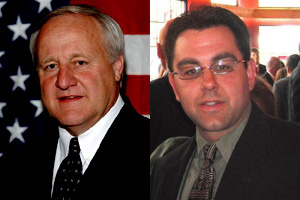 Rupert Murdoch's media empire News Corp., which represents the second largest media conglomerate in the world behind the Walt Disney Company, is taking a severe beating as Murdoch himself is having to address various criminal allegations, including that his News of the World tabloid illegally hacked private phone lines and committed various other crimes
Rupert Murdoch's media empire News Corp., which represents the second largest media conglomerate in the world behind the Walt Disney Company, is taking a severe beating as Murdoch himself is having to address various criminal allegations, including that his News of the World tabloid illegally hacked private phone lines and committed various other crimes
But Murdoch's media malpractice runs even deeper as his strong connections to the pharmaceutical industry also fueled his media machine's fabrication of lies against Dr. Andrew Wakefield, as well as hid from the public the true dangers of DNA vaccines that permanently corrupt human genes and cause autism.
Murdoch's media malpractice and the genetic altering of human beings through DNA vaccines
Audits show health violations in drinking water
 Environmental Protection Agency audits show that many states are failing to accurately note health violations such as elevated levels of arsenic and chlorine in drinking water, according to a new report .
Environmental Protection Agency audits show that many states are failing to accurately note health violations such as elevated levels of arsenic and chlorine in drinking water, according to a new report .
The U.S. Government Accountability Office reviewed EPA audits of 43 states, including Virginia and Maryland, conducted between 2007 and 2009. In 2009, 84 percent of monitoring violations noted by states were not reported to the EPA. That same year, 26 percent of health violations were not reported or were inaccurately reported, undermining the reliability of data collected by the EPA under the Safe Drinking Water Act as well as its ability to conduct oversight, according to the GAO.
News International 'deliberately' blocked investigation
 Rupert Murdoch's News International has been found by a parliamentary committee to have "deliberately" tried to block a Scotland Yard criminal investigation into phone hacking at the News of the World, the Guardian has learned.
Rupert Murdoch's News International has been found by a parliamentary committee to have "deliberately" tried to block a Scotland Yard criminal investigation into phone hacking at the News of the World, the Guardian has learned.
The report by MPs from the all-party home affairs committee will be released on Wednesday and its publication has been moved forward in time for today's statement by prime minister David Cameron on the scandal.
Demorcatic Sen. Dave Hansen wins Wisconsin recall election
 Voters have spoken out against recall efforts of Green Bay Democratic Senator Dave Hansen. With 65% of the preliminary voting results in, Hansen is expected to win the recall election with more than two-thirds of the vote against Republican David VanderLeest.
Voters have spoken out against recall efforts of Green Bay Democratic Senator Dave Hansen. With 65% of the preliminary voting results in, Hansen is expected to win the recall election with more than two-thirds of the vote against Republican David VanderLeest.
Hansen’s win is expected to set the tone for upcoming recall elections of six Republican set for August 9th, and for two other Democrats facing recall elections on August 16th.
Stress-related condition ‘incapacitates’ Bachmann; heavy pill use alleged
 The Minnesota Republican frequently suffers from stress-induced medical episodes that she has characterized as severe headaches. These episodes, say witnesses, occur once a week on average and can “incapacitate” her for days at time.
The Minnesota Republican frequently suffers from stress-induced medical episodes that she has characterized as severe headaches. These episodes, say witnesses, occur once a week on average and can “incapacitate” her for days at time.
On at least three occasions, Bachmann has landed in the hospital as a result. “She has terrible migraine headaches. And they put her out of commission for a day or more at a time. They come out of nowhere, and they’re unpredictable,” says an adviser to Bachmann who was involved in her 2010 congressional campaign.
Institute of Medicine backs free birth control for women
 A U.S. medical advisory group recommended providing women free birth control and other preventive health services under the nation's healthcare overhaul.
A U.S. medical advisory group recommended providing women free birth control and other preventive health services under the nation's healthcare overhaul.
The Institute of Medicine report, commissioned by the Obama administration, recommended that all U.S.-approved birth control methods -- including the "morning after pill," taken shortly after intercourse to forestall pregnancy -- be added to the federal government's list of preventive health services.
Obama endorses repeal of Defense of Marriage Act
 President Obama endorses a new congressional proposal to repeal the Defense of Marriage Act, which basically defines marriage as between a man and a woman. This year, the administration said it would no longer defend the Defense of Marriage Act in federal court.
President Obama endorses a new congressional proposal to repeal the Defense of Marriage Act, which basically defines marriage as between a man and a woman. This year, the administration said it would no longer defend the Defense of Marriage Act in federal court.
White House spokesman Jay Carney said: The president has long called for a legislative repeal of the so-called Defense of Marriage Act, which continues to have a real impact on the lives of real people, our families, friends and neighbors.
He is proud to support the Respect for Marriage Act, introduced by Sen. (Dianne) Feinstein and
New twist in anthrax case; Justice Department lawyers contradict FBI findings
 The Justice Department has called into question a key pillar of the FBI's case against Bruce Ivins, the Army scientist accused of mailing the anthrax-laced letters that killed five people and terrorized Congress a decade ago.
The Justice Department has called into question a key pillar of the FBI's case against Bruce Ivins, the Army scientist accused of mailing the anthrax-laced letters that killed five people and terrorized Congress a decade ago.
Shortly after Ivins committed suicide in 2008, federal investigators announced that they'd identified him as the mass murderer who sent the letters to members of Congress and the news media. The case was circumstantial, with federal officials arguing that the scientist had the means, motive and opportunity to make the deadly powder at the U.S. Army Medical Research Institute of Infectious Diseases at Fort Detrick, Md.
Phone hacking suspect advised Downing Street before election
 David Cameron was drawn further into the phone hacking scandal tonight when Tory Central Office was forced to admit that Neil Wallis, a former deputy editor of the News of the World who has been arrested and questioned over hacking, may have advised Andy Coulson, Mr Cameron's closest press adviser before the last election.
David Cameron was drawn further into the phone hacking scandal tonight when Tory Central Office was forced to admit that Neil Wallis, a former deputy editor of the News of the World who has been arrested and questioned over hacking, may have advised Andy Coulson, Mr Cameron's closest press adviser before the last election.
It is the latest astonishing admission by Downing Street and piles further pressure on Mr Cameron over his hiring of Mr Coulson, who has also been arrested and questioned recently by detectives investigating the scandal.
More Articles...
Page 607 of 1174




































